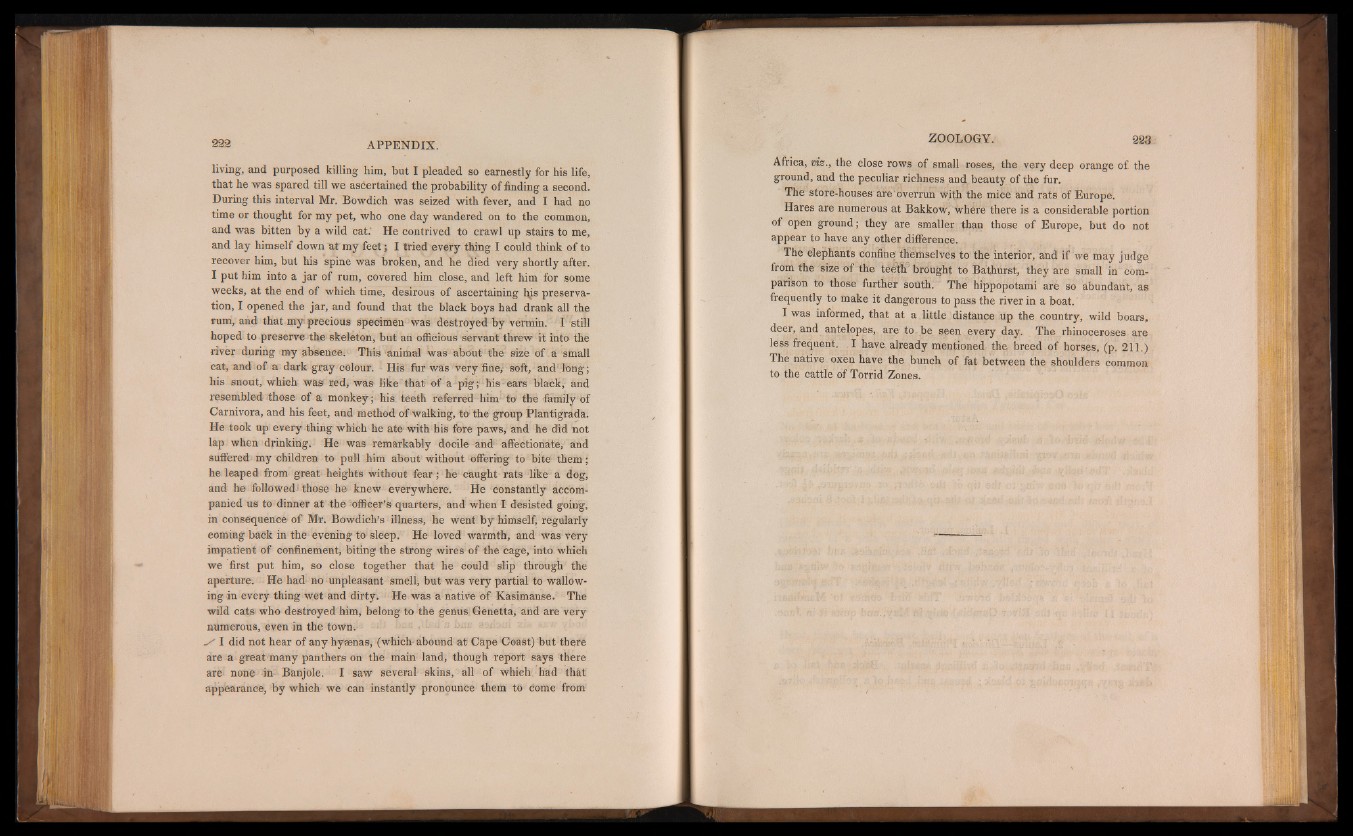
living, and purposed killing him, but I pleaded so earnestly for his life,
that he was spared till we ascertained the probability of finding a second.
During this interval Mr. Bowdich was seized with fever, and I had no
time or thought for my pet, who one day wandered on to the common,
and was bitten by a wild cat.' He contrived to crawl up stairs to me,
and lay himself down at my feet; I tried every thing I could think of to
recover him, but his spine was broken, and he died very shortly after.
I put him into a jar of rum, covered him close, and left him for some
weeks, at the end of which time, desirous of ascertaining lys preservation,
I opened the jar, and found that the black boys had drank all the
rum, and that my precious specimen was destroyed by vermin. I still
hoped to preserve the skeleton, but an officious servant threw it into the
river during my absence. This animal was-about the size of a small
cat, and of a dark gray celour. His fur was very fine,* soft, and' long;
his snout, which w as red, was like that of a pig; Ms-ears black, and
resembled those of a monkey; his teeth referred him to the family of
Carnivora, and his feet, and method of walking, toi the group Plantigrada.
He took up every thing which he ate with his fore paws, and he did not
lap when drinking. He was remarkably docile and affectionate, and
suffered my children to pull him about without offering to bite them ;
he leaped from great heights without fear; he caught rats like a dog,
and he followed- those he knew everywhere. He constantly accompanied
us to dinner at the ;offieer’s quarters, and when I desisted going,
in consequence of Mr. Bowdich’s illness, he went by himself, regularly
coming back in the evening to sleep. H e loved warmth, and was very
impatient of confinement, biting the strong wires of the cage, into which
we first put him, so close together that he could slip through the
aperture. He had no unpleasant smell, but was very partial to wallowing
in every thing w et and dirty. He was a native of Kasimanse. The
wild cats who destroyed him, belong to the genus Genetta, and are very
numerous, even in the town.
I did not hear of any hyaenas, (which- abound at Cape Coast) but there
are a great many panthers on the main land, though report says there
are none in Banjole. I saw several skins, all of which had that
appearance, by which we can instantly pronounce them to come from
Africa, viz., the close rows of small roses, the very deep orange of the
ground, and the peculiar richness and beauty of the fur.
Thé store-houses are overrun with the mice and rats of Europe.
Hares are numerous at Bakkow, whèrè there is a considerable portion
of open ground ; they are smaller than those of Europe, but do not
appear to have any other difference.
The elephants confihe themselves to the interior, and if we may judge
from the size of the teeth brought to Bathurst, they are small in comparison
to those further south. The hippopotami are so abundant, as
frequently to make it dangerous to pass the river in a boat.
I was informed, that at a little distance up the country, wild boars,
deer, and antelopes, are to. be seen every day. The rhinoceroses are
less frequent. I have, already mentioned the breed of horses, (p. 211.)
The native oxen have the bunch of fat between the shoulders common
to the cattle of Torrid Zones.